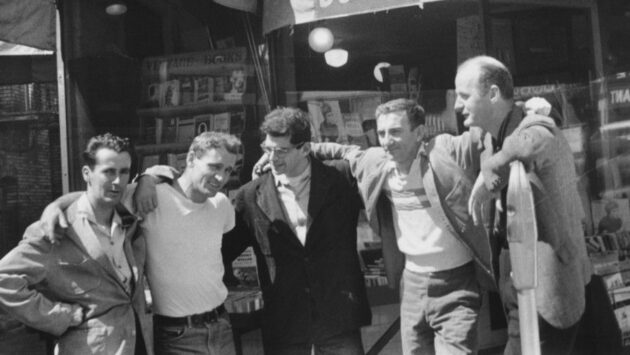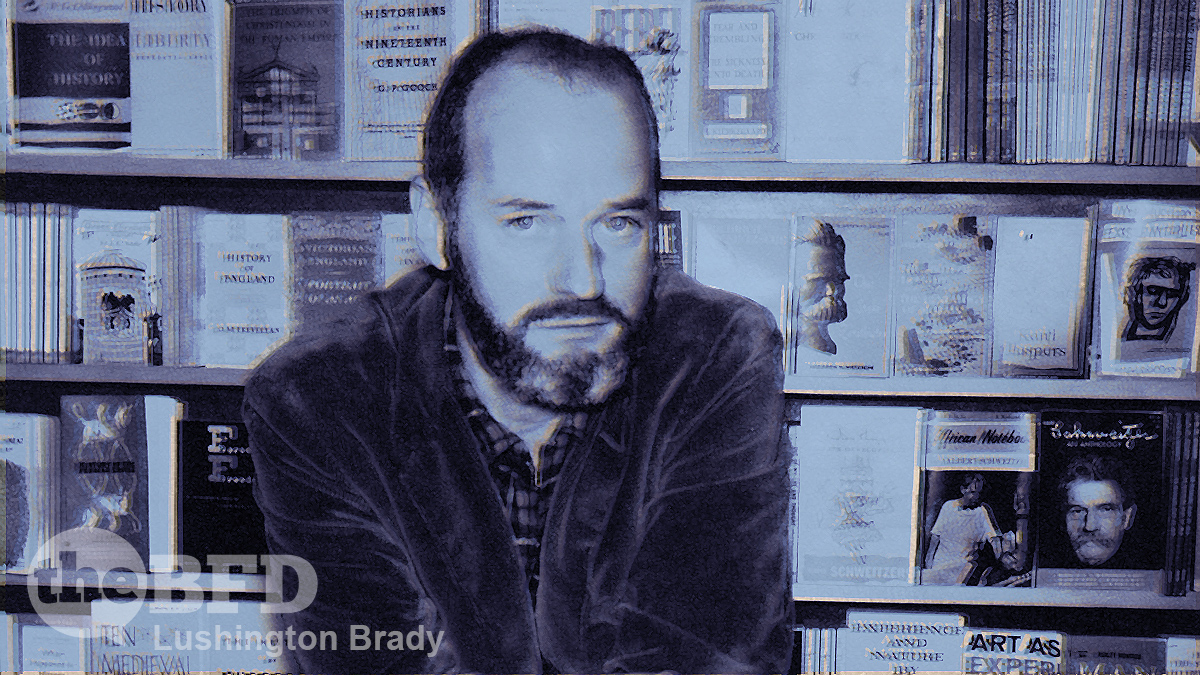The popular image of the Beats – perhaps the last truly great American literary movement – is Jack Kerouac’s description of “the mad ones[ who…]burn, burn, burn like fabulous yellow roman candles exploding”. Certainly, Kerouac himself died aged just 47, largely as a result of a lifetime of alcohol abuse. Kerouac’s fellow-traveller and lifestyle muse Neal Cassady died a year earlier and six years younger than Kerouac. Before he died, Cassady allegedly lamented, “Twenty years of fast living – there’s just not much left…Don’t do what I have done”.
But many of the Beats in fact displayed remarkable longevity: Allen Ginsberg lived to 70, William S Burroughs 83, Lucien Carr 79, and Herbert Huncke 81.
Lawrence Ferlinghetti outlived nearly all of them.
Poet, publisher and bookseller Lawrence Ferlinghetti, who helped launch and perpetuate the Beat movement, has died. He was 101.
Ferlinghetti died at his San Francisco home Monday (US time), his son Lorenzo Ferlinghetti told The Associated Press Tuesday. The cause was lung disease.
His father died “in his own room,” holding the hands of his son and his son’s girlfriend, “as he took his last breath, his son said.
Lorenzo Ferlinghetti said his father loved Italian food and the restaurants in the North Beach neighbourhood where he made his home and founded his famous bookstore. He had received the first dose of the COVID vaccine last week and was a month shy of turning 102.
Although he was an accomplished poet in his own right, Ferlinghetti’s contribution to the Beat movement (which he never really felt himself to be part of) went much further. His iconic bookstore City Lights was one of the world’s best known, and as a publisher, Ferlinghetti published most of the Beats – most famously, Allen Ginsberg’s seminal Howl.
As he described in his poem Autobiography, Ferlinghetti was, an American. I was an American boy…a boy scout in the suburbs. In WWII, Ferlinghetti served in the navy, where he landed in Normandy in a rowboat that turned over. Experiences such as Normandy, and witnessing the aftermath of Nagasaki, turned the poet into a lifelong anti-war activist.
In 1953, Ferlinghetti teamed with Peter D Martin, who had been publishing a magazine titled City Lights. The two invested $500 each and opened the bookstore of the same name.
Few poets of the past 60 years were so well known or so influential. His books sold more than 1 million copies worldwide, a fantasy for virtually any of his peers, and he ran one of the world’s most famous and distinctive bookstores, City Lights.
Although he never considered himself one of the Beats, he was a patron and soul mate and, for many, a lasting symbol — preaching a nobler and more ecstatic American dream.
“Am I the consciousness of a generation or just some old fool sounding off and trying to escape the dominant materialist avaricious consciousness of America?” he asked in Little Boy, a stream of consciousness novel published around his 100th birthday.
[City Lights] publishing arm released books by Jack Kerouac, Allen Ginsberg, William S. Burroughs and many others. The most famous release was Ginsberg’s anthemic poem, Howl. It led to a 1957 obscenity trial that broke new ground for freedom of expression.
Now considered one of the great works of American literature, Howl, became famous for such stanzas as, I saw the best minds of my generation destroyed by madness, starving hysterical naked, dragging themselves through the negro streets at dawn looking for an angry fix, Angel-headed hipsters burning for the ancient heavenly connection to the starry dynamo in the machinery of night. It also quickly led its publishers to court. Ultimately, the judge ruled that the poem had “redeeming social importance”.
Perhaps inspired by the experience, Ferlinghetti wrote of The poet’s eye obscenely seeing.

He could also be whimsical, writing that, I didn’t get much sleep last night thinking/about underwear/Have you ever stopped to consider/underwear in the abstract/When you really dig into it/some shocking problems are raised.
Just as he defied the censors, Ferlinghetti in many ways defied history.
The internet, superstore chains and high rents shut down numerous booksellers in the Bay Area and beyond, but City Lights remained a thriving political and cultural outlet[…]
The store even endured during the coronavirus outbreak, when it was forced to close and required $US300,000 to stay in business.
A GoFundMe campaign quickly raised $US400,000. Ferlinghetti, tall and bearded, with sharp blue eyes, could be soft-spoken, even introverted and reticent in unfamiliar situations.
But he was the most public of poets and his work wasn’t intended for solitary contemplation.
It was meant to be recited or chanted out loud, whether in coffee houses, bookstores or at campus gatherings. His 1958 compilation, A Coney Island of the Mind, sold hundreds of thousands of copies in the US. alone.
Long an outsider from the poetry community, Ferlinghetti once joked that he had “committed the sin of too much clarity.”He called his style “wide open” and his work, influenced in part by e.e. cummings, was often lyrical and childlike: “Peacocks walked/under the night trees/in the lost moon/light/when I went out/looking for love,” he wrote in Coney Island.
Sydney Morning Herald
But, first and foremost, he was, as he wrote, “An American” – with all that that entails.
Please share this article so that others can discover The BFD

